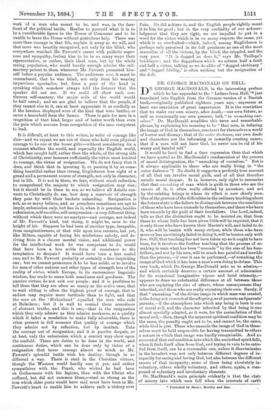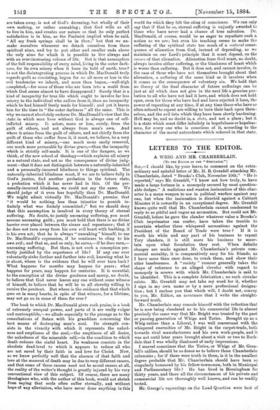DR. GEORGE MACDONALD ON HELL.
DR GEORGE MACDONALD, in the interesting preface which he has appended to the "Letters from Hell," just translated into English from the German version of a Danish book,—originally published eighteen years ago,—expresses at least one conviction of great importance. It is the conviction that we make our own misery, after death,—our own future, as well as occasionally our own present, hell, "in unmaking our- selves." Dr. MacDonald amplifies this terse and remarkable phrase, by explaining his meaning to be "that men, in defacing the image of God in themselves, construct for themselves a world of horror and dismay ; that of the outer darkness, our own deeds and characters are the informing or inwardly creating cause; that if a man will not have God, he never can be rid of his weary and hateful self."
It would be hard to find a finer expression than that whieh we have quoted as Dr. MacDonald's condensation-of the process of moral disintegration, the " unmaking of ourselves." But is it always applicable to those who are really living in "the outer darkness "P No doubt it suggests a perfectly trim account of all that can involve moral guilt, and of all that therefore
entails moral despair. It is, however, only right to remember that that unmaking of man which is guilt in those who are the
causes of it, is often really effected by ancestors, and not by the existing beings in whom its effect is now chiefly seen. One of the gravest of the difficulties in the ordinary teaching abortt
the future state is the failure to distinguish between the condition of those who have been unmade by themselves, and those whe have been unmade by the guilt of their forefathers. Oar Lord, indeed, tells us that the distinction ought to be insisted on, that from those to whom little has been given little will be required, that it is only those who have known their Master's will, and failed to do it, who will be beaten with many stripes, while those who have more or less un wittingly failed in doing it, will be beaten only with few. Still, that teaching has not been taken up as it ought to have been, for it involves the further teaching that the process of re- making in man what has been " unmade " by the sins of his fore- fathers, and not by his own, will be much less painfuland terrible than the process,—if ever it can be performed,—of remaking the image of God which it has been a man's own doing to deface. This very book, which Dr. George MacDonald asks us to admire,— and which certainly deserves a certain amount of admiration for its occasional imaginative vigour and lurid intensity,— appears to draw no substantial difference at all between -those who are expiating the sins of others, whose consequences they inherited, and those who are really expiating their own. Surely, if that " unmaking " of the divine image in which mast-was created, is the doing not so much of the offspring, as of parents and parents' parents,—if the atmosphere into which any being is born is one of moral evil, and the character inherited by that being is one almost specially adapted, as it were, for the assimilation of that moral evil,—then, though the apparent spiritual condition may be the same, the penalty ought not to be, and cannot be, the same, while God is just. Those who unmade the image of God in them- selves must be held responsible for having transmitted to others a nature in which that image was hardly recognisable. And no account of that evil condition into which the unclothed spirit falls, when it finds itself alien from God, and trying in vain to be satis- fied from itself, can be a reasonable one, unless it discriminates in the broadest way, not only between different degrees of ' in- capacity for seeing and loving God, but also between the different causes of that incapacity, some of them being absolutely in- voluntary, others wholly voluntary, and others, again, a com- pound of voluntary and involuntary elements.
Dr. MacDonald's main principle evidently is that 'the state of misery into which men fall when the interests of earth • Published by -Messrs. Bentley and Bea. •
are taken away, is not of God's decreeing, but wholly of their own making, or rather unmaking ; that God wills us all to live in him, and creates our nature so that its only perfect satisfaction is in him, as the Psalmist implied when he said, "All my fresh springs shall be in thee ;" but that we un- make ourselves whenever we detach ourselves from these spiritual aims, and try to put other and smaller ends above the only aims for which it is possible to live always and with an ever-increasing volume of life. But is that assumption of the full responsibility of every mind, living in the outer dark- ness, for its own misery when it loses its hold of earth, true P fs not the disintegrating process in which Dr. MacDonald truly regards guilt as consisting, begun for us all more or less in the evil tendencies we inherit, and more than begun,—well-digh completed,—for some of those who are born into a world from which God seems almost to have disappeared? Surely that is a kind of incapacity for true life which ought to involve far less misery to the individual who suffers from it, than an incapacity which he had himself freely made for himself; and yet it leaves him for the time in "the outer darkness" all the same. This is why we cannot absolutely endorse Dr. MacDonald's view that the state: in which man lives without God is always one of self- inflicted misery. It arises, more or lees, surely, from the guilt of others, and not always from man's own. And where it arises from the guilt of others, and not chiefly from the guilt of those who suffer from it, it must, we believe, be a very different kind of misery,—one much more easily removed, one much more permeable by divine grace,—than the incapacity which is strictly self-made. It is one of the dangers, as we think, of the new school of theology—which explains all misery as a natural state, and not as the consequence of divine judg- ment—that it does not distinguish between a naturally-inherited and a personally-incurred blindness to things spiritual. The naturally-inherited blindness must, if we are to believe fully in God's justice, find another probation in the future state, a probation which it has never had in this. Of the per- sonally-incurred blindness, we could not say the same. We should judge of it even less hopefully than Dr. MacDonald. We might admit virtually Dr. MacDonald's premiss that "it would be nothing less than injustice to punish in- finitely what was finitely committed ;" but we should deny that this assumption is involved in every theory of eternal suffering. No doubt, to justify unceasing suffering, you must assume unceasing guilt ; you must hold that there is no divine barrier ever placed between the sinner and repentance; that if he does not turn away from his own evil heart with loathing, it is his own act; that he is always " unmaking " himself, to use Dr. MacDonald's expression, if he continues to cling to his own evil ; and that so, and so only, he earns,—if he does earn,— unceasing suffering. But then, is not such a conception per- fectly justified by the experience of life ? If any one ever voluntarily sinks further and further into evil, knowing what he is about, where is the evidence that he will ever turn hack? What happens for months may happen for years ; what happens for years, may happen for centuries. It is essential, to the conception of the divine goodness and mercy, no doubt, to believe that God never leaves any one without some witness of himself, to believe that he will be to all eternity willing to receive the penitent. But where is the evidence that that which goes on in many hearts, in spite of that witness, for a lifetime, may not go on in some of them for ever ?
The book to which Dr. MacDonald gives such praise, is a book of extremely unequal power, and parts of it are really vulgar and contemptible,—we allude especially to the passage as to the consultations of Satan with his granddam concerning the best means of destroying man's soul. Its strength con- sists in the vivacity with which it represents the naked- ness and emptiness of the soul,—the emptiness of all desire, the nakedness of the miserable self, —in the condition to which death reduces the sinful heart. Its weakness consists in the absolute dead. level to which it appears to reduce all who are not saved by their faith in and love for Christ. Now, as we know perfectly well that the absence of that faith and love at the moment of death may be due to very different causes, and that some of these causes need not be moral causes at all, the reality of the writer's thought is greatly injured by his very conventional view of this subject. Of course, there are many theologians who, with the author of this book, would not shrink from saying that souls often suffer eternally, and without hope of any alleviation, who have never done anything in this
world for which they felt the sting of conscience. We can only say that if that be so, eternal suffering is unjustly awarded to those who have never had a chance of true salvation. Dr. MacDonald, of course, would be as eager to repudiate such a notion as we are; but even his teaching seems to make the suffering of the spiritual state too much of a natural conse- quence of alienation from God, instead of depending, as we maintain on our Lord's principle that it must depend, on the causes of that alienation. .Alienation from God mast, no doubt, always involve either suffering, or the blankness of heart which is worse than suffering. But it does not, and cannot involve, in the case of those who have not themselves brought about that alienation, a suffering of the same kind an it involves when it comes as the consequence of voluntary sin. We hold that no theory of the final character of future sufferings can be just at all which does not give in the next life a genuine pro- bation to all who have not had it here, and which does not hold open, even for those who have had and have rejected it here, the power of repenting at any time, if at any time those who have so often refused to repent are willing to turn their back upon them- selves, and the evil into which they have been slowly hardening. Hell may be, and no doubt is, a state, and not a place ; but it is a state which must differ infinitely in hopefulness or hopeless- ness, for every one who is conscious of it, according to the character of the moral antecedents which ushered in that state.



































 Previous page
Previous page